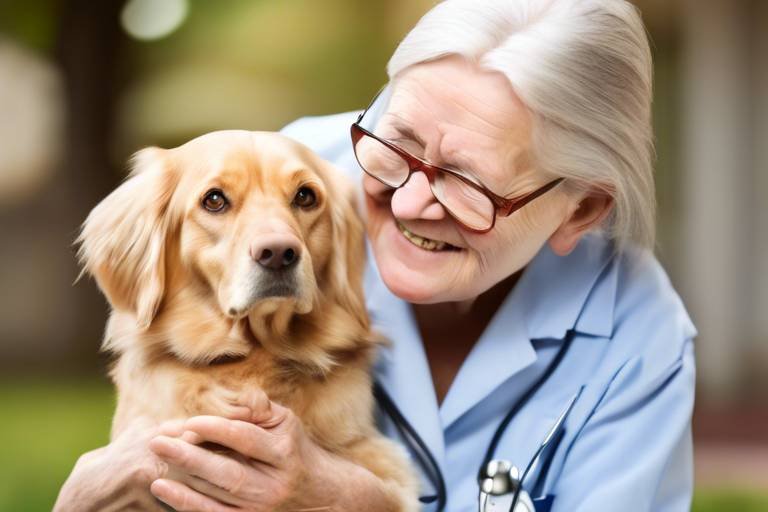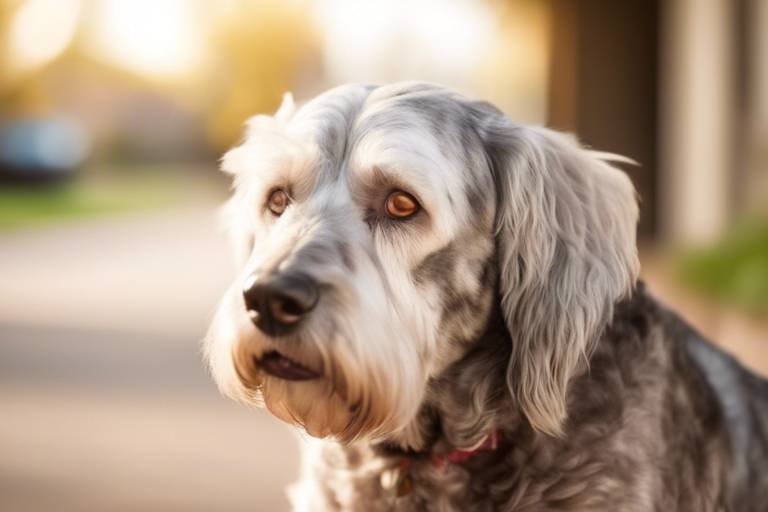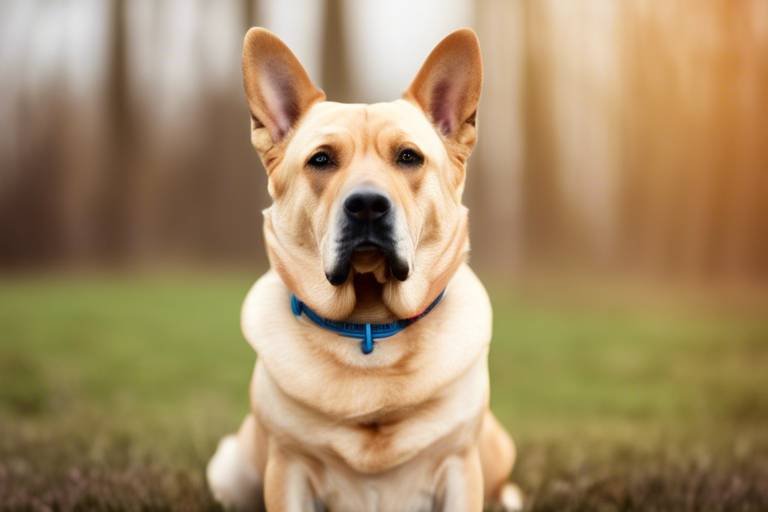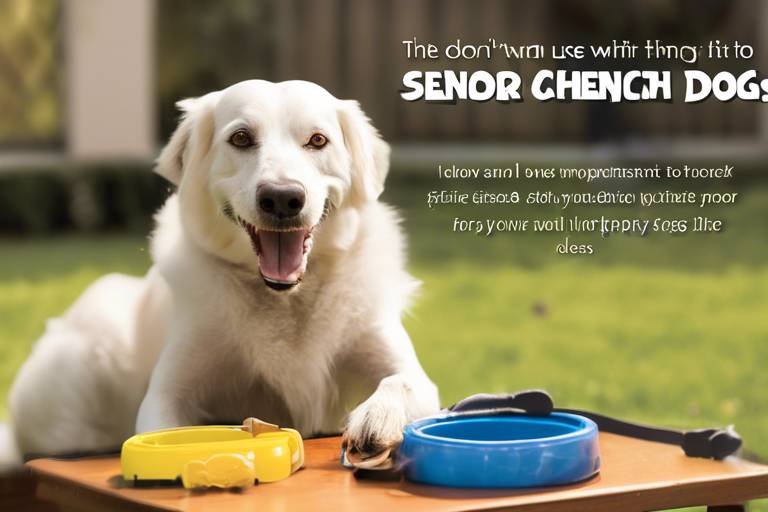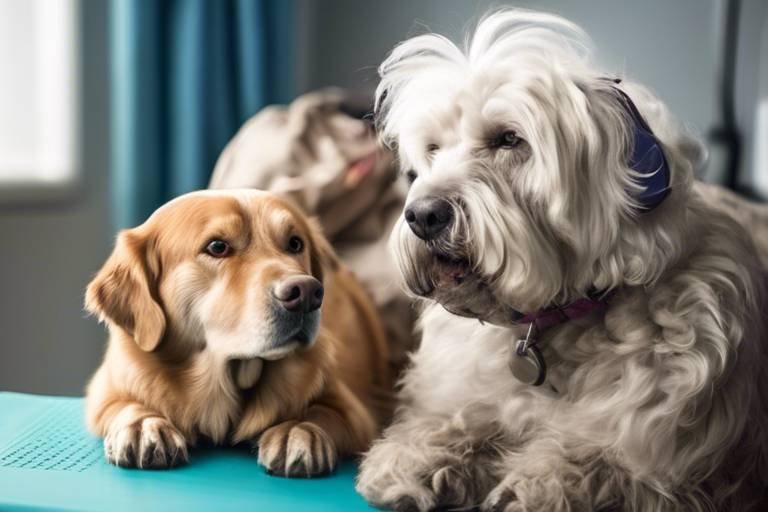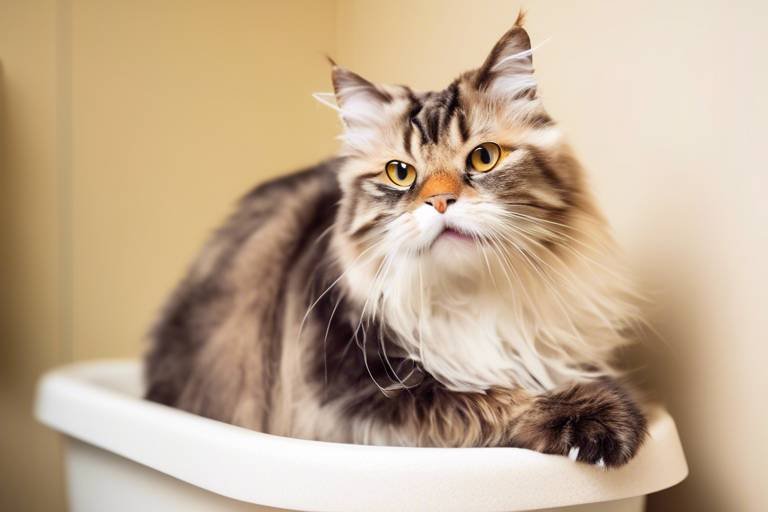Tips for Caring for Senior Pets with Heart Conditions
As our beloved furry companions age, they face a variety of health challenges, and one of the most concerning issues is heart conditions. Just like humans, senior pets can suffer from heart diseases that can significantly impact their quality of life. It's crucial for pet owners to be equipped with the right knowledge and tools to manage these conditions effectively. In this article, we will explore essential tips for caring for senior pets with heart conditions, ensuring they remain comfortable and happy in their golden years.
Heart conditions in pets can manifest in several ways, often presenting symptoms that might be mistaken for normal aging. Common types of heart issues include congestive heart failure, heart murmurs, and cardiomyopathy. Symptoms to watch for include persistent coughing, difficulty breathing, lethargy, and a decrease in appetite. Early detection is key; regular veterinary check-ups can lead to timely diagnosis and management. Just like catching a leak in a roof before it floods your living room, recognizing these signs early can make all the difference in your pet's health.
Nutrition plays a pivotal role in managing heart conditions in senior pets. A well-balanced diet can help support heart health and improve overall well-being. It's essential to consult with your veterinarian about the best dietary plan tailored to your pet's specific needs. Here are some critical aspects to consider:
For pets with heart issues, low-sodium diets are often recommended. Excess sodium can lead to fluid retention, putting additional strain on the heart. When selecting food, look for options that clearly state they are low in sodium. Reading labels can feel like deciphering a secret code, but it’s worth it for your pet's health. Here’s a quick comparison of some common food options:
| Food Type | Sodium Content (mg/100g) | Notes |
|---|---|---|
| Commercial Low-Sodium Dog Food | 50 | Formulated specifically for heart health |
| Homemade Chicken & Rice | 30 | Simple and low in sodium |
| Regular Dog Food | 150 | High sodium content; avoid |
Preparing homemade meals can be a great way to ensure your pet receives balanced nutrition tailored to their needs. However, it comes with its own set of challenges. You must ensure that the meals are nutritionally complete. Consulting with a veterinary nutritionist can help you create a balanced diet that meets your pet's heart health requirements. Think of it like crafting a perfect recipe; the right ingredients can make all the difference!
There are many commercial diets specifically formulated for pets with heart conditions. These diets are designed to provide the necessary nutrients while keeping sodium levels low. When selecting a commercial diet, check the ingredient list for quality sources of protein, fiber, and essential fatty acids. It’s like shopping for a new car; you want to know what’s under the hood before making a decision!
Proper hydration is crucial for senior pets with heart issues. Dehydration can worsen heart conditions, so it’s important to encourage your pet to drink plenty of water. You can do this by:
- Providing fresh water daily
- Using a pet water fountain to entice them
- Adding water or low-sodium broth to their food
Think of hydration as the oil in an engine; without it, things just don’t run smoothly!
Finding the right balance between exercise and rest is vital for senior pets with heart conditions. While they need to stay active to maintain their health, overexertion can lead to serious complications. Gentle exercise routines, such as short walks or light play, can help keep their hearts healthy without pushing them too hard. It’s important to monitor their behavior during these activities; if they seem fatigued or distressed, it’s time to take a break.
Tailoring exercise to your pet's capabilities is essential. Low-impact activities like leisurely walks, gentle fetch, or even swimming can provide the necessary physical activity without overwhelming them. Think of it as a slow dance; it’s all about rhythm and listening to your partner’s cues.
Keep an eye on your pet's activity levels. If you notice any signs of fatigue, such as excessive panting, reluctance to continue, or unusual behavior, it’s crucial to stop the activity and let them rest. Just like a well-tuned instrument, your pet’s body needs to be in harmony with its activity level.
Regular veterinary visits are essential for senior pets with heart conditions. These check-ups allow for monitoring of your pet's health and adjustments to their care plan as needed. During these visits, expect your vet to conduct thorough examinations, including listening to the heart, checking blood pressure, and possibly running blood tests. Think of your vet as a coach; they’re there to help you keep your team healthy and ready to play!
Being aware of the warning signs that indicate your senior pet may be experiencing heart distress is crucial. Symptoms such as rapid breathing, coughing, weakness, or loss of appetite should not be ignored. Recognizing these signs early can lead to timely intervention and care, much like catching a cold before it turns into the flu.
Finally, creating a safe and comfortable home environment can significantly benefit senior pets with heart conditions. Reducing stressors, providing cozy resting spots, and maintaining a calm atmosphere can promote relaxation and comfort. Think of your home as a sanctuary; it should be a place where your pet feels safe and secure.
Q: How can I tell if my pet's heart condition is worsening?
A: Watch for signs such as increased coughing, difficulty breathing, lethargy, or changes in appetite. If you notice any of these, consult your veterinarian promptly.
Q: Can I give my pet supplements for heart health?
A: Some supplements may benefit heart health, but always consult your veterinarian before introducing any new products to your pet's diet.
Q: How often should I take my senior pet to the vet?
A: Typically, senior pets should have check-ups every six months, but your vet may recommend more frequent visits based on your pet's specific health needs.
Q: Are there specific breeds more prone to heart issues?
A: Yes, certain breeds like Cavalier King Charles Spaniels, Boxers, and Doberman Pinschers are more prone to heart conditions. Regular monitoring is essential for these breeds.
Q: What are the best exercises for senior pets with heart conditions?
A: Gentle walks, short play sessions, and swimming are excellent low-impact exercises that can help maintain physical health without overexertion.

Understanding Heart Conditions in Pets
When it comes to our furry companions, their health is always a top priority, especially as they age. Heart conditions in senior pets can be a serious concern, and understanding these conditions is crucial for ensuring their well-being. Just like humans, pets can suffer from various heart issues, which can significantly affect their quality of life. So, what exactly are these heart conditions, and how can we identify them?
There are several types of heart conditions that can affect senior pets, including congestive heart failure, valvular disease, and cardiomyopathy. Each of these conditions can manifest differently and may require specific management strategies. For instance, congestive heart failure occurs when the heart is unable to pump blood efficiently, leading to fluid accumulation in the lungs or abdomen. This can cause symptoms such as coughing, difficulty breathing, and lethargy. On the other hand, valvular disease is characterized by the deterioration of heart valves, which can lead to heart murmurs and other complications.
Recognizing the symptoms of heart conditions early on can make a significant difference in your pet's treatment and overall prognosis. Common signs to watch for include:
- Persistent coughing
- Shortness of breath
- Lethargy
- Weight loss
- Swollen abdomen
Early detection is vital because it allows for timely intervention, which can help manage the condition more effectively. Regular veterinary check-ups are essential for monitoring your pet's heart health, especially as they enter their senior years. During these visits, your veterinarian may perform a physical examination, listen for heart murmurs, and recommend diagnostic tests such as X-rays or echocardiograms to assess your pet's heart function.
So, how can you be proactive in caring for a senior pet with a heart condition? First and foremost, maintaining open communication with your veterinarian is key. They can provide tailored advice based on your pet's specific health needs. Additionally, being observant of any changes in your pet's behavior or physical condition can help catch potential issues early. Remember, your pet relies on you to notice when something is off, so staying vigilant is essential.
In conclusion, understanding heart conditions in pets is a critical aspect of caring for our senior companions. By being aware of the symptoms, recognizing the importance of early detection, and fostering a strong relationship with your veterinarian, you can help ensure your furry friend leads a comfortable and fulfilling life despite their heart condition. After all, our pets deserve the best care we can provide!

Dietary Considerations
When it comes to caring for our senior pets, especially those with heart conditions, diet plays a crucial role in their overall well-being. Just like humans, pets need a balanced diet tailored to their specific health needs. A well-thought-out diet can not only help manage their heart condition but also enhance their quality of life. It’s essential to consult with your veterinarian to create a personalized nutrition plan that meets your pet’s unique requirements.
One of the first things to consider is the nutritional composition of your pet's food. Senior pets often require a diet that is lower in calories but rich in essential nutrients. This means focusing on high-quality proteins, healthy fats, and a mix of vitamins and minerals. Portion control is equally important; overfeeding can lead to obesity, which can exacerbate heart issues. Always measure their food portions and be mindful of treats, which can add unnecessary calories.
Additionally, supplements can play a significant role in supporting heart health. Omega-3 fatty acids, for example, are known for their anti-inflammatory properties and can help improve heart function. Antioxidants such as vitamins E and C can also be beneficial. However, it’s vital to discuss any supplements with your veterinarian to ensure they are appropriate for your pet's specific condition.
One of the most important dietary considerations for pets with heart conditions is reducing sodium intake. High sodium levels can lead to fluid retention, increasing the workload on the heart. Therefore, it’s essential to choose foods that are specifically labeled as low-sodium. Many commercial pet foods are now available with reduced sodium content, but always check the labels. A low-sodium diet not only helps manage heart disease but can also improve your pet's overall health.
Preparing homemade meals for your senior pet can be a great way to control their diet and ensure they receive balanced nutrition. However, it’s essential to do this carefully. Homemade meals should include a mix of lean proteins, whole grains, and plenty of vegetables. While it can be a rewarding experience, it’s crucial to consult with your veterinarian or a pet nutritionist to ensure that the meals meet all of your pet’s dietary needs. A well-rounded homemade diet can be beneficial, but it requires planning and knowledge.
If homemade meals seem daunting, there are many commercial diets specifically formulated for pets with heart conditions. These diets are designed to provide complete nutrition while addressing the unique needs of senior pets. Look for products that emphasize:
| Ingredient | Benefit |
|---|---|
| High-quality protein | Supports muscle maintenance |
| Omega-3 fatty acids | Promotes heart health |
| Low sodium | Reduces fluid retention |
| Antioxidants | Supports overall health |
When selecting a commercial diet, always read the ingredient list and consult your veterinarian for recommendations. They can help you determine which brands and formulations will best suit your pet's needs.
Don’t forget about hydration! Proper hydration is vital for senior pets, especially those with heart conditions. Dehydration can lead to further complications, so it’s essential to encourage your pet to drink plenty of water. You might consider adding water or low-sodium broth to their food or providing a pet water fountain to entice them to drink more. Keeping them hydrated can significantly impact their overall health and comfort.
In summary, when caring for senior pets with heart conditions, paying attention to their dietary needs is paramount. By opting for low-sodium diets, considering homemade meal options, or selecting high-quality commercial diets, you can help ensure your furry friend lives a comfortable and healthy life.
Low-Sodium Diets
When it comes to caring for senior pets with heart conditions, one of the most critical aspects is their diet. A low-sodium diet can significantly improve the quality of life for your furry friend. Why is sodium such a big deal? Well, just like in humans, excess sodium can lead to fluid retention and increased blood pressure in pets, putting extra strain on their already compromised hearts. By reducing sodium intake, you can help manage these risks and promote better heart health.
But how do you go about implementing a low-sodium diet for your pet? First off, it's essential to read labels carefully. Many commercial pet foods are loaded with sodium, often used as a preservative or flavor enhancer. Look for options that specifically state they are low in sodium or formulated for heart health. It’s like choosing a road with fewer bumps for a smoother ride—your pet’s heart will thank you!
Here’s a quick comparison of sodium content in various pet food types:
| Type of Food | Sodium Content (mg per serving) |
|---|---|
| Commercial Dry Food | 200-400 |
| Commercial Wet Food | 300-500 |
| Homemade Diet | Varies (can be controlled) |
As you can see, the sodium content can vary widely between different types of food. If you opt for a homemade diet, you have the advantage of controlling the ingredients and ensuring that sodium levels stay low. However, be cautious—homemade meals should still be balanced and include all the necessary nutrients your pet needs.
Additionally, you might be wondering what specific foods are safe for your senior pet. Some great options include:
- Fresh fruits and vegetables like carrots, green beans, and apples (without seeds)
- Lean proteins such as chicken or turkey (without skin)
- Whole grains like brown rice or quinoa
These foods not only provide essential nutrients but also help keep sodium levels in check. Remember, it’s always best to consult your veterinarian before making any drastic changes to your pet’s diet. They can guide you on the best food choices tailored to your pet's specific health needs.
In summary, a low-sodium diet can be a game-changer for senior pets with heart conditions. By focusing on fresh, wholesome foods and avoiding high-sodium commercial options, you're taking a proactive step toward ensuring your furry friend leads a healthier, happier life. After all, a well-fed pet is a happy pet!
Homemade Meal Options
When it comes to caring for senior pets with heart conditions, homemade meals can be a fantastic option. Not only do they allow you to control the ingredients, ensuring your furry friend gets the best nutrition possible, but they also provide an opportunity to cater specifically to their unique dietary needs. Imagine being able to whip up a meal that not only tastes great but also supports their heart health!
However, as with any dietary change, there are some important considerations to keep in mind. First and foremost, you want to ensure that the meals are balanced and provide all the necessary nutrients. This includes proteins, carbohydrates, fats, vitamins, and minerals. A well-rounded diet is crucial for maintaining your pet's health and energy levels, especially when they are dealing with heart issues.
Here are some key ingredients to consider when preparing homemade meals for your senior pet:
- Lean Proteins: Chicken, turkey, and fish are excellent sources of protein. They help maintain muscle mass and provide energy.
- Whole Grains: Brown rice and oats can serve as good carbohydrate sources, giving your pet the energy they need without overloading on unhealthy fats.
- Fruits and Vegetables: Incorporating fruits like blueberries and vegetables such as carrots can boost antioxidant levels, which are essential for heart health.
- Healthy Fats: Omega-3 fatty acids found in fish oil can be beneficial for heart health. Just be cautious with portion sizes!
While homemade meals can be tailored to your pet’s needs, it’s vital to consult with your veterinarian. They can help you formulate a diet plan that meets your pet’s specific requirements. They might also recommend supplements to ensure your pet is getting everything they need, particularly if you’re making meals at home.
Additionally, be aware of any potential challenges. Preparing homemade meals can be time-consuming, and you may need to experiment to find recipes that your pet enjoys. It can also be tricky to ensure that the meals are nutritionally complete. To help with this, consider using a reputable recipe book or online resource specifically designed for pets with heart conditions.
In conclusion, homemade meals can be a wonderful way to show your senior pet some love while supporting their heart health. Just remember to do your research, consult your vet, and enjoy the process of cooking for your furry friend. After all, a happy pet is a healthy pet!
Q: Can I feed my senior pet the same homemade meals every day?
A: It's best to vary their diet to ensure they receive a range of nutrients. Consult your vet for a balanced meal plan.
Q: What should I avoid when making homemade meals for my pet?
A: Avoid ingredients that are high in sodium, unhealthy fats, and harmful substances like chocolate, onions, and grapes.
Q: How can I tell if my pet is enjoying their homemade meals?
A: If they eagerly eat their food and seem satisfied, that's a good sign! Watch for any changes in appetite or digestion.
Commercial Diets
When it comes to caring for senior pets with heart conditions, selecting the right commercial diet can make a world of difference. Unlike regular pet food, these specially formulated diets are designed to address the unique nutritional needs of pets suffering from heart issues. They typically contain lower levels of sodium, which is crucial for managing heart health, alongside essential nutrients that support overall well-being. But how do you choose the best one for your furry friend?
First, it’s important to read the labels carefully. Look for products that list high-quality protein sources as the primary ingredient. Ingredients like chicken, fish, or lamb should come first, indicating a protein-rich diet that can help maintain muscle mass in aging pets. Additionally, you want to ensure that the diet includes omega fatty acids, which are vital for promoting a healthy heart and reducing inflammation. Here’s a quick breakdown of what to look for:
| Nutrient | Importance |
|---|---|
| Low Sodium | Helps manage blood pressure and reduces fluid retention. |
| High-Quality Protein | Supports muscle maintenance and overall health. |
| Omega Fatty Acids | Promotes heart health and reduces inflammation. |
| Antioxidants | Boosts immune function and combats oxidative stress. |
Another critical aspect of selecting a commercial diet is to consult with your veterinarian. They can provide recommendations based on your pet’s specific condition, age, and weight. Some brands are specifically tailored for pets with heart issues and have undergone rigorous testing to ensure they meet the necessary health standards. Brands that you might consider include Hill's Prescription Diet, Royal Canin Veterinary Diet, and Purina Pro Plan Veterinary Diets. Each of these options has a variety of flavors and formulations that cater to the diverse needs of senior pets.
It’s also worth noting that transitioning to a new diet should be done gradually. Sudden changes can upset your pet’s digestive system, leading to discomfort and reluctance to eat. Mix the new food with the old one over a week or so, gradually increasing the proportion of the new diet. This can help your pet adjust more comfortably to their new culinary routine.
In conclusion, choosing the right commercial diet for your senior pet with heart conditions is not just about picking a bag off the shelf. It involves understanding their unique needs, consulting with your vet, and making informed choices that will contribute to their overall health and happiness. Remember, a well-nourished pet is a happy pet, and by investing time in their dietary needs, you can significantly enhance their quality of life.
- What should I look for in a commercial diet for my senior pet? Focus on low sodium content, high-quality proteins, omega fatty acids, and antioxidants.
- Can I mix commercial diets with homemade meals? Yes, but consult with your veterinarian to ensure balanced nutrition.
- How long should I transition to a new diet? Gradually over a week to prevent digestive issues.
- Are there specific brands recommended for pets with heart conditions? Yes, brands like Hill's, Royal Canin, and Purina offer specialized diets.
Hydration Needs
When it comes to caring for senior pets with heart conditions, one of the most crucial aspects to consider is their . Just like humans, pets rely on water to keep their bodies functioning properly, and this becomes even more important as they age. Dehydration can exacerbate heart issues, leading to a cascade of health problems that can affect their overall well-being. So, how can you ensure your furry friend stays adequately hydrated?
First and foremost, it's essential to understand that senior pets may not drink as much water as they should. This can be due to a variety of reasons, including decreased thirst drive, dental issues, or even the side effects of medications. As a pet owner, you need to be proactive in encouraging them to drink more. One effective strategy is to provide fresh, clean water at all times and to change it frequently. Pets are more likely to drink if their water is appealing and free of any odors or debris.
Additionally, you might consider incorporating wet food into their diet. Canned food can significantly increase their overall water intake. For example, if your pet typically eats dry kibble, mixing in some wet food can be a game-changer. Not only does this provide hydration, but it also adds flavor and variety to their meals, making mealtime more enjoyable. If you're unsure how to balance their diet, consult your veterinarian for tailored advice.
Another great way to boost hydration is through water-rich treats. Fruits and vegetables like watermelon, cucumber, and even certain broths can be excellent options. However, always check with your vet before introducing new foods, especially if your pet has specific dietary restrictions. You can also try offering ice cubes or ice chips as a fun treat, which not only keeps them cool but also encourages licking and chewing, promoting hydration.
To help you keep track of your pet’s hydration, you might want to monitor their water intake. Here’s a simple table to guide you on how much water your senior pet should ideally drink daily:
| Pet Weight | Daily Water Intake (approx.) |
|---|---|
| 5 lbs | 1/2 cup |
| 10 lbs | 1 cup |
| 20 lbs | 2 cups |
| 40 lbs | 4 cups |
| 60 lbs | 6 cups |
| 80 lbs | 8 cups |
Lastly, always be on the lookout for signs of dehydration, such as dry gums, lethargy, or decreased skin elasticity. If you notice any of these symptoms, it's vital to consult your veterinarian immediately. Keeping your senior pet hydrated is not just about quenching their thirst; it's about ensuring they live a comfortable, healthy life, especially when dealing with heart conditions.
- How can I tell if my pet is dehydrated? Look for signs such as dry gums, lethargy, and decreased skin elasticity.
- Is wet food better for hydration? Yes, wet food has higher moisture content, which can help keep your pet hydrated.
- What fruits can I give my pet for hydration? Watermelon and cucumber are great options, but always check with your vet first.

Exercise and Activity Levels
When it comes to our beloved senior pets with heart conditions, finding the right balance between exercise and rest can feel like walking a tightrope. You want your furry friend to stay active and healthy, but at the same time, you don’t want to push them beyond their limits. It’s crucial to understand that, just like us, senior pets have unique needs that change as they age. So, how do you strike that perfect balance? Let’s dive into the world of gentle exercise routines and monitoring activity levels.
First off, let’s talk about the importance of **gentle exercise**. For senior pets, especially those with heart issues, low-impact activities can be incredibly beneficial. Think of it like a leisurely stroll in the park instead of a sprint. Activities such as short walks, light play sessions, or even gentle stretching can help maintain their physical health without putting too much strain on their hearts. The key is to keep it enjoyable and stress-free. For instance, a quick game of fetch in the backyard can be a delightful way to get some exercise without overexerting them.
But how do you know when your pet is reaching their limit? Monitoring activity levels is essential. Watch for signs of fatigue or distress, such as excessive panting, drooping ears, or reluctance to move. If you notice any of these signs, it’s time to slow down. It’s all about listening to your pet and adjusting their activity accordingly. Remember, a tired pet is not necessarily a happy pet, especially when heart health is at stake.
To help you keep track of your pet’s exercise routine, consider creating a simple log. This could include:
- The type of activity
- Duration of the activity
- Any signs of fatigue or distress
Keeping a record can help you identify patterns and adjust their routine as needed. Plus, it can be a great conversation starter during your next veterinary visit!
As you navigate this journey, it’s also important to consult your veterinarian. They can provide tailored advice on the best exercise routines for your specific pet’s condition. After all, nobody knows your pet better than their vet. They can help you design a plan that prioritizes heart health while still allowing for some fun and engagement.
In conclusion, keeping your senior pet with heart conditions active doesn’t have to be daunting. With gentle exercise routines and careful monitoring, you can ensure they enjoy a fulfilling life while taking care of their heart health. Just remember to be patient and attentive, and your furry friend will thank you with wagging tails and happy purrs!
Q: How much exercise does my senior pet need?
A: Generally, senior pets should have short, frequent exercise sessions. Aim for 10-15 minutes of gentle activity, two to three times a day, but always consult your vet for personalized recommendations.
Q: What types of activities are best for senior pets with heart conditions?
A: Low-impact activities like short walks, gentle play, and stretching exercises are ideal. Avoid high-intensity activities that could strain their hearts.
Q: How can I tell if my pet is overexerting themselves?
A: Watch for signs of fatigue such as excessive panting, drooping ears, or reluctance to continue. If you notice these signs, it’s best to stop the activity and allow them to rest.
Q: Should I consult my vet about my pet's exercise routine?
A: Absolutely! Your veterinarian can provide tailored advice based on your pet’s specific health needs and help you create a safe and effective exercise plan.
Gentle Exercise Routines
When it comes to caring for senior pets with heart conditions, the right kind of exercise can make all the difference. Just like us, our furry friends need to stay active to maintain their health, but the key is to find that perfect balance. Overexertion can lead to fatigue or even serious complications, so the focus should be on gentle, low-impact activities that keep them moving without pushing their limits. Think of it as a leisurely stroll in the park versus a marathon—both have their place, but for our senior pets, the former is far more suitable!
One of the best ways to ensure your pet gets the exercise they need is to establish a routine that incorporates short, manageable sessions of activity throughout the day. This could involve taking several short walks instead of one long one. Aim for walks that last around 10 to 15 minutes, adjusting the duration based on how your pet responds. Pay attention to their body language; if they seem tired or reluctant, it’s time to head home.
In addition to walking, you can introduce gentle playtime activities that stimulate their minds and bodies. For instance, consider using soft toys that they can gently interact with. Engaging in light games of fetch or hide-and-seek can keep their spirits high and their hearts healthy. Just remember, it’s not about how fast they can run but rather about keeping them active and engaged in a way that feels comfortable for them.
Moreover, swimming can be an excellent option for senior pets, especially those that enjoy water. It’s a low-impact exercise that allows them to move without putting stress on their joints or heart. If you have access to a pet-friendly pool or a safe body of water, this could be a fun and refreshing way for your pet to get their exercise in without overexerting themselves.
Finally, consider incorporating stretching sessions into their routine. Just like humans, pets benefit from gentle stretching to maintain flexibility and circulation. You can guide them through simple stretches by encouraging them to reach for treats or toys placed slightly out of their reach. It’s a fun way to bond while ensuring they stay limber!
Here’s a quick overview of some gentle exercise options for your senior pet:
| Exercise Type | Duration | Benefits |
|---|---|---|
| Leisurely Walks | 10-15 minutes | Improves cardiovascular health, promotes bonding. |
| Gentle Playtime | 5-10 minutes | Stimulates mental engagement, encourages movement. |
| Swimming | 15-20 minutes | Low-impact exercise, great for joints. |
| Stretching Sessions | 5 minutes | Enhances flexibility and circulation. |
Remember, the goal is to keep your senior pet moving while ensuring they feel safe and comfortable. Always consult with your veterinarian before starting any new exercise routine, especially if your pet has specific health concerns. By making exercise a fun and enjoyable part of their day, you can help improve their overall health and happiness!
Q: How often should I exercise my senior pet?
A: Aim for short sessions of exercise multiple times a day, adjusting based on your pet's energy levels and comfort.
Q: What signs should I look for to know if my pet is overexerted?
A: Watch for signs of fatigue such as heavy panting, reluctance to continue, or signs of distress. If you notice any of these, it's best to stop the activity.
Q: Can all senior pets swim?
A: Not all pets are natural swimmers. Always supervise your pet around water, and consider their comfort level before introducing them to swimming.
Q: Should I consult my vet before starting an exercise routine?
A: Yes! It's always wise to consult with your veterinarian to tailor an exercise plan that suits your pet's specific health needs.
Monitoring Activity
Monitoring the activity levels of your senior pet with heart conditions is crucial for their overall health and well-being. Just like us, pets can experience fatigue and distress, especially when engaging in physical activities. It's essential to strike a balance between keeping them active and ensuring they don't overexert themselves. So, how do you effectively monitor your furry friend's activity? Well, it starts with understanding their normal behavior and recognizing when something seems off.
Begin by observing your pet during their daily routines. Take note of how much energy they typically have throughout the day. Are they usually playful and energetic, or do they prefer lounging around? This baseline will help you identify any changes in their behavior. For instance, if your pet suddenly becomes lethargic or shows reluctance to engage in activities they once enjoyed, it could be a sign of distress related to their heart condition.
Another effective method is to keep a log of your pet's activities. You can use a simple notebook or even a mobile app to track how long and how often they engage in play, walks, or other forms of exercise. This log will not only help you notice patterns but also serve as a useful tool to discuss with your veterinarian during check-ups. If you notice any significant fluctuations, don’t hesitate to reach out to your vet for advice.
Additionally, pay attention to your pet's breathing and heart rate during and after exercise. A normal resting heart rate for dogs varies by size, but generally, it ranges from 60 to 140 beats per minute. Cats typically have a resting heart rate of 140 to 220 beats per minute. If you notice that your pet's heart rate is significantly elevated or if they are breathing heavily after a short walk, it might be time to cut back on their activity level. Remember, a little bit of exercise is great, but too much can lead to complications.
To help you keep track of your pet’s activity levels and ensure they are not overdoing it, consider using the following simple checklist:
- Observe their overall energy levels.
- Log daily activities and durations.
- Monitor breathing and heart rate during activity.
- Look for signs of fatigue, such as excessive panting or reluctance to continue.
By staying vigilant and proactive, you can help your senior pet enjoy their golden years while managing their heart condition effectively. Remember, it's all about quality of life, and your attentive care can make a world of difference!
Q1: How often should I exercise my senior pet with a heart condition?
A1: It's best to consult your veterinarian for personalized advice, but generally, short, frequent walks or gentle play sessions are recommended. Aim for 10-15 minutes of activity a few times a day, adjusting based on your pet's tolerance.
Q2: What signs indicate my pet is overexerting themselves?
A2: Watch for excessive panting, drooling, or a reluctance to continue activity. If your pet seems unusually tired or starts to lag behind, it’s essential to give them a break.
Q3: Should I avoid all exercise for my senior pet with heart issues?
A3: Not at all! While some activities may need to be limited, gentle exercise is beneficial for maintaining their health. Always consult with your vet for guidelines tailored to your pet's specific condition.

Regular Veterinary Check-ups
Regular veterinary check-ups are absolutely crucial for senior pets with heart conditions. Just like we humans need our annual physicals to keep an eye on our health, our furry friends require the same kind of attention, especially when they are more vulnerable to health issues. These visits allow your veterinarian to monitor your pet's heart health, adjust medications if necessary, and catch any potential problems before they escalate. Think of it as a safety net; it’s better to catch something early rather than wait until it becomes a serious concern.
During these check-ups, your vet will typically perform a range of tests to assess your pet's condition. This might include:
- Physical Examination: A thorough check-up to listen to the heart, check for any irregularities, and assess overall health.
- Blood Tests: These can reveal a lot about your pet's organ function and overall health status.
- X-rays or Ultrasound: Imaging can help visualize the heart and lungs, providing valuable insights into your pet's condition.
It's also important to keep track of any changes in your pet's behavior or health between visits. Are they more lethargic than usual? Have they lost interest in their favorite activities? These signs can be indicative of underlying issues and should be communicated to your vet promptly. Remember, your pet can’t tell you when something feels off, so being observant is key.
Moreover, establishing a regular check-up schedule is essential. Depending on your pet's specific condition, your vet may recommend visits every 6 months, or even more frequently if they are experiencing significant health challenges. This routine not only helps in monitoring heart health but also strengthens the bond between you and your veterinarian, ensuring that your pet receives the best possible care.
In summary, regular veterinary check-ups are a vital component of managing your senior pet's heart condition. They provide an opportunity for early detection of potential issues, allow for timely interventions, and ultimately contribute to your pet's overall well-being and quality of life. So, don’t skip those appointments – your furry friend is counting on you!
Q: How often should my senior pet see the vet?
A: Generally, senior pets with heart conditions should have check-ups every 6 months, but your vet may recommend more frequent visits based on their health status.
Q: What should I expect during a veterinary check-up?
A: Expect a thorough physical exam, possible blood tests, and imaging tests like X-rays or ultrasounds to assess heart health.
Q: Are there any signs I should look for between vet visits?
A: Yes! Look for changes in behavior, lethargy, loss of appetite, or difficulty breathing, and report these to your vet immediately.
Q: Can I ask my vet questions during the visit?
A: Absolutely! Your vet is there to help, so don't hesitate to ask any questions or voice concerns you may have about your pet's health.

Recognizing Signs of Distress
As pet owners, it’s crucial to be vigilant about our furry friends, especially when they are seniors battling heart conditions. Recognizing the signs of distress can be the difference between prompt intervention and a serious health crisis. Just like humans, pets can’t verbally express their discomfort, so we need to be their voice. Imagine your pet as a delicate flower; if you don’t pay attention to its needs, it might wilt away. So, what should you look for?
One of the first signs that something might be off is changes in behavior. If your once playful pup suddenly becomes lethargic or disinterested in activities they once loved, this could be a red flag. Similarly, if your cat, who used to be the queen of the house, starts hiding away or seems unusually anxious, these are significant indicators that they may be struggling. It's essential to observe their daily routines and note any deviations, as these can often hint at deeper issues.
Another critical sign to watch for is changes in breathing. Pets with heart conditions may exhibit labored or rapid breathing, especially after minimal exertion. If you notice your pet panting excessively while resting or struggling to catch their breath, it’s time to consult your veterinarian. Just as a car engine sputters when it’s not functioning correctly, your pet’s breathing patterns can indicate underlying problems.
Additionally, keep an eye out for coughing or wheezing. If your pet starts to cough frequently or produces a wheezing sound, these symptoms could signal fluid buildup in the lungs, a common issue in pets with heart disease. It’s like hearing a strange noise from your car; it’s a sign that something needs immediate attention. Don’t ignore these sounds; they could be your pet’s way of saying, “Help me!”
Another important aspect to consider is appetite changes. If your pet suddenly loses interest in food or shows signs of nausea, such as drooling or vomiting, it may indicate that they are feeling unwell. Just as we lose our appetite when we’re sick, our pets can experience similar feelings. Monitor their eating habits closely and consult your vet if you notice significant changes.
Lastly, be aware of physical signs such as swelling in the abdomen or limbs. This can be a sign of fluid retention, which is often associated with heart failure. If you notice your pet’s belly appearing larger or their legs looking swollen, it’s essential to seek veterinary help immediately. Think of it like a balloon that’s been overfilled; it’s only a matter of time before it bursts if the pressure isn’t relieved.
In conclusion, being proactive and observant can significantly impact your senior pet's quality of life. By recognizing these signs of distress, you can ensure that your beloved companion receives the care they need promptly. Remember, you know your pet better than anyone else; trust your instincts and don’t hesitate to reach out to your veterinarian if you have concerns.
- What should I do if I notice signs of distress in my pet?
Immediately consult your veterinarian for advice and potential treatment options.
- Are there specific symptoms that indicate a serious issue?
Yes, symptoms like severe lethargy, labored breathing, persistent coughing, and appetite loss are serious and warrant immediate attention.
- How can I prepare for a vet visit if my pet shows distress?
Keep a log of the symptoms you’ve observed, including when they occur and any changes in behavior or appetite.

Creating a Comfortable Environment
Creating a comfortable environment for your senior pet with heart conditions is crucial for their well-being. Think of it as crafting a cozy sanctuary where they can thrive. Just like we want our homes to be a haven, our furry friends deserve the same. The atmosphere you create can significantly impact their stress levels and overall quality of life. So, how do you go about this? Let’s dig into some essential elements that can help make your pet feel safe and comfortable.
First and foremost, consider the layout of your home. Senior pets may struggle with mobility, so it’s essential to ensure that their living space is easily navigable. Remove any obstacles that could pose a risk, such as loose rugs or clutter. Instead, create a clear path for them to move around freely. You might even want to set up a designated area with their bed, toys, and food and water bowls, ensuring it’s easily accessible. This space can serve as their personal retreat, a place where they can relax without feeling overwhelmed.
Temperature control is another vital aspect. Senior pets can be sensitive to extreme temperatures, so maintaining a comfortable climate is essential. In warmer months, make sure they have a cool place to lie down, away from direct sunlight. During colder seasons, provide them with a warm blanket or a heated bed to snuggle into. It’s all about creating an environment that feels just right for them.
Furthermore, consider their sensory needs. Older pets often have diminished senses, so keeping the environment calm and quiet can help reduce anxiety. Avoid loud noises and sudden movements that might startle them. Soft lighting and soothing colors can also create a more relaxing atmosphere. You might even want to play gentle music or nature sounds, which can have a calming effect on your pet.
Another important point is to keep their space clean and hygienic. Regularly clean their bedding and living area to prevent any allergens or irritants from affecting their health. This is especially important for pets with heart conditions, as they may have compromised immune systems. A clean environment not only promotes health but also gives you peace of mind.
Lastly, companionship plays a significant role in your senior pet's comfort. Spend quality time with them, whether it’s through gentle petting or simply sitting together. This not only reassures them but also strengthens your bond. Remember, your presence can be the most comforting thing in their world.
- What are the signs that my senior pet is uncomfortable? Look for signs such as excessive panting, restlessness, or hiding. If your pet seems to be struggling to find a comfortable position or appears anxious, it might be time to reassess their environment.
- How can I make my pet's bed more comfortable? Ensure their bed is soft and supportive. Consider adding a memory foam mattress or orthopedic bed for extra comfort, especially if they have joint issues.
- Should I use air conditioning or heating for my pet? Yes, maintaining a comfortable temperature is crucial. Use air conditioning in the summer and heating in the winter to ensure they are comfortable.
- How often should I clean my pet's area? Regular cleaning is essential. Aim to clean their space at least once a week, or more frequently if needed, to keep it hygienic.
Frequently Asked Questions
-
What are the common heart conditions that affect senior pets?
Senior pets can suffer from various heart conditions, including congestive heart failure, dilated cardiomyopathy, and mitral valve disease. Each condition presents unique symptoms like coughing, difficulty breathing, and lethargy. Early detection is crucial, so regular vet check-ups are essential to catch these issues before they escalate.
-
How can I adjust my pet's diet to support their heart health?
Adjusting your pet's diet is vital for managing heart conditions. Focus on low-sodium options and consult your vet for specific dietary recommendations. Incorporating high-quality protein and omega-3 fatty acids can also be beneficial. Homemade meals can be a great option, but ensure they are balanced and meet all nutritional needs.
-
How much exercise should my senior pet get?
Exercise is essential, but it should be gentle and tailored to your pet's condition. Short, low-impact walks and play sessions are ideal. Monitor your pet closely for signs of fatigue or distress, and always consult your veterinarian to create an appropriate exercise plan.
-
What signs should I look for that indicate my pet is in distress?
Watch for symptoms like excessive panting, coughing, weakness, or reluctance to move. If your pet seems unusually tired or shows signs of discomfort, it’s crucial to consult your veterinarian promptly. Early intervention can make a significant difference in their quality of life.
-
How often should my senior pet see the vet?
For senior pets with heart conditions, regular veterinary check-ups are important. Aim for at least every six months, or more frequently if your vet recommends it. These visits can help monitor your pet's condition and adjust treatment plans as necessary.
-
Can I give my pet supplements to support heart health?
Yes, certain supplements can benefit heart health, such as omega-3 fatty acids, CoQ10, and taurine. However, always consult your veterinarian before adding any supplements to your pet's diet to ensure they are safe and appropriate for your pet's specific health needs.
-
What can I do to create a comfortable environment for my senior pet?
Creating a comfortable environment involves reducing stressors and providing a cozy space for your pet to rest. Consider using soft bedding, minimizing loud noises, and keeping their living area at a comfortable temperature. A calm atmosphere can significantly improve their overall well-being.






